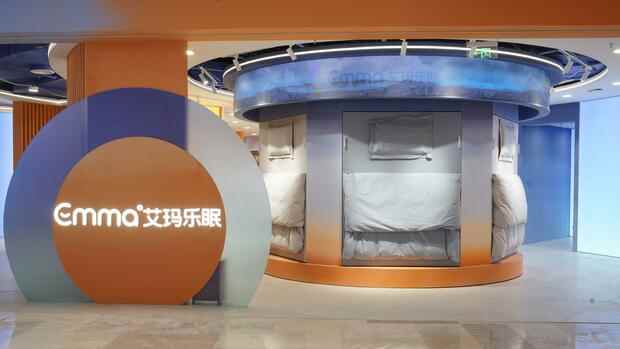The company is planning a franchise chain with hundreds of stores in China.
(Photo: Emma Sleep)
Dusseldorf The start of mattress manufacturer Emma in China was initially driven by coincidence: As one of the employees was from Hong Kong, the company began selling its mattresses online in the Special Administrative Region in 2018 – as the first market outside of Europe.
That worked surprisingly well despite the brand, which is still unknown there. In 2019, Emma founder Manuel Müller decided on a real market launch in China – with success: Last year, the company grew there by more than 50 percent with online trading via marketplaces.
That is why the next big step is now following: the start-up in which the family company Haniel holds the majority, wants to cover China with a network of its own stores. “We need several hundred stores to have a significant effect in China,” said Emma boss Müller in an interview with Handelsblatt.
A chain is planned that will be built up together with franchise partners. 30 stores are to be opened this year, says Müller. After that, the pace of expansion is expected to increase. “We want to open between 30 and 50 stores per year and cover a large part of the important cities in China with franchise partners,” explains the Emma boss.
Top jobs of the day
Find the best jobs now and
be notified by email.
Emma has now opened her first shop in Shanghai, and a second in the city will follow soon. “The first two shops are blueprints that can then be multiplied in a franchise system,” explains Müller. The future franchise partners could take a look at the concept there. “We then already know exactly how big the investment is, which location is worthwhile and how the salespeople have to be trained,” says the Emma boss.
Aldi and Hugo Boss also have stores in China
Most German companies are relying on online trading for their expansion in China. But not only Emma complements the stationary stores in order to achieve a stronger presence of the brand in the awareness of customers. For example, Aldi Süd and Hugo Boss have opened their own stores.
Because Made in Germany is in demand there. Western brands still have a market in China, and consumer demand for imported goods is growing, confirms Elena Gatti of Azoya. The company supports German manufacturers with their start in China. “The market is extremely attractive for Western e-commerce brands because of its size, growth and increasing prosperity,” says the expert.
A localized marketing strategy is crucial. In addition, the German manufacturer must carefully analyze the wishes of Chinese consumers and position its brand accordingly.
The founder and managing director of the mattress start-up Emma wants to position his products as a luxury brand in China.
(Photo: Emma)
Emma apparently took this to heart. The manufacturer will position its brand significantly differently in China than in Europe, where the start-up is more of an inexpensive online provider. “In our shops we sell a range of five mattresses that were developed for China and are made in Germany,” says Müller. “These are products that are slowly entering the luxury price range and that can also cost 3,000 to 4,000 euros.”
Chinese customers are brand and status conscious
“As a German manufacturer, we have to achieve a brand upgrade in order to set ourselves apart from the local, but also from the American competition,” says Müller, explaining this different positioning in China. There are many German brands that are positioned significantly higher and more expensive in China than in their home market. “Miele, for example, which is even available with gold-plated buttons in China,” says Müller.
This is exactly why own stores are important. “The Chinese customer is much more brand-conscious and status-driven,” says the Emma boss. “That is why we decided to open shops in order to build trust in our brand with consumers.” Once the customer has got to know the brand there, he will also inquire about it online in the future.
Emma has the economic strength for the expansion not only through the main owner Haniel in the background. The company increased sales in 2020 by 170 percent to 405 million euros – and achieved a double-digit million profit. “That was not repeated in the past year, but the growth is still so high that we can be proud of it,” says the Emma boss. And he is very confident about this year too.
The expansion plans for the stationary business are correspondingly ambitious. “If the shops in China prove to be a success and we get a good feel for the franchise business model,” explains Müller, “I can well imagine that we could try it in other countries as well.”
More: E-Commerce in China: This is how German retailers can earn money in business worth billions.
